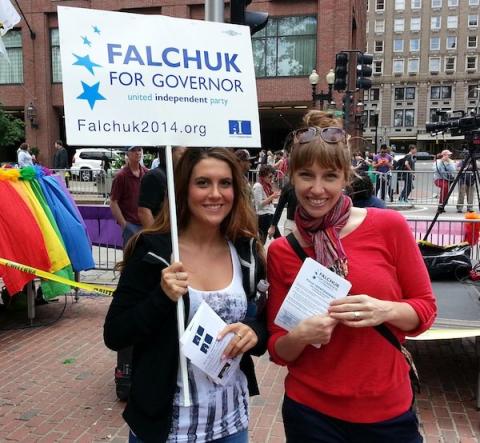Even more thoughts go through it when you know it will be as an independent.
If you’re doing the hard work of very deliberately planning the many details of your campaign, the questions at first are almost nonstop:
“How will my family and friends take this?”
“What about staff, headquarters, and fundraising?”
“Which are the best ways to reach voters with what I know is a credible message?”
“How do I compete with the machines of the two big parties?”
“Does the law allow me to raise as much money as Democratic and Republican candidates?” (It doesn’t, by the way; Republicans and Democrats in our state, by laws they created, can raise more than 15 times what any independents are permitted to raise.)
It’s been said it takes a certain sort of madness to run for office of any sort, but I’d argue in a state like Massachusetts – with not one independent elected official in our State House, and where a whopping 63 percent of races were unopposed in 2012 – running as an independent seemed especially daunting.
But, I’m doing this for a reason. It’s not a campaign slogan or shopworn, partisan catchphrase designed to rile people up. It’s not because it’s expected or because I’m part of some sort of “dynasty.” It wouldn’t mean a raise, or glamorous galas and fundraisers, and certainly not a smooth ride.
As alien as it may sound to cynics, it’s because I am a true believer.
I believe voters shouldn’t have to settle for candidates who only adhere to one of two party platforms. Like so many people I know and meet, I have watched as the two parties moved further and further away from what so many voters want. It’s been happening for years, but there really hasn’t been anywhere else to turn outside the two-party lock on politics in our state.
I believe that by moving from tired old sound bites, fearmongering and partisan bickering, we have a genuine opportunity to move toward a more inclusive, thoughtful dialogue that includes so many more voices – whether industry experts, neighborhood groups, businesses of all sizes and nonprofit thought leaders, and individuals who just want their opinions actually heard and acknowledged.
Most of all, I believe we must create trust in our government, and in the leaders we elect. I believe we can –- but not if the outdated, complacent two-party system remains so firmly entrenched. Not if any new, innovative ideas from independent voters and candidates continue to be blocked from the table. This can’t be overstated.
A free and fair democracy should not be limited to only two parties – it’s just what so many of us have become used to.
So what’s involved in launching an independent campaign for governor? A lot comes down to plain old hard work. It really does.
My campaign staff, volunteers and I have made considerable progress in the few short months since I formally announced my candidacy as an independent this year. Enough to make some people shake their heads and ask how we’re doing it so quickly – and this is a good thing.
On the rare occasions a naysayer has clucked, “You’ll never beat the machine,” we remember this early progress already achieved and it motivates us all to work that much harder.
To get the ball rolling, we took a number of practical steps. We created what’s called a “political designation” in Massachusetts, a precursor of sorts to an official “Party.”
Next, I formed my candidate committee, and launched the one other fundraising entity I am permitted as an independent in Massachusetts to have, the United Independent PAC.
During this time, we also completed our core messaging explaining our focus, launched our website, assembled our press lists, set up our social media pages, began volunteer trainings, moved into our headquarters, hired additional staff, began canvassing efforts, completed a statewide poll focused on what voters say their priorities are, launched our ongoing series of Meet-the-Candidate mixers statewide, set up our campaign newsletters, did press interviews and meetings with newspaper editors and radio hosts, and wrote and published op-eds in major papers across the state.
Meanwhile, we have worked very hard to check every campaign rule and legal regulation to be sure we were dotting every required “i” in the book. We have done all of this with a staff of just four, and a growing community of enthusiastic volunteers so very committed to our cause.
By far, what’s been most important and most helpful has been the tremendous amount of time we spend with people around the state.
It sounds overly simplistic, but it’s true. If we were shortsighted, we could just assume we know the right answers and what’s best for voters, but as we’ve learned from all these years of watching the two major parties, assuming you know what’s right is not at all the same thing as actually asking voters their opinions and taking the time to build consensus.
It’s amazing what you learn just by sharing your ideas outside a grocery store, asking for feedback at a food truck festival, or learning from voters’ suggestions on the subway.
Politics used to include more of a two-way, open exchange of ideas, even if everybody didn’t always agree. However, today’s politicians – so scripted with poll-tested sound bites, and so afraid of making mistakes or ever veering from the party line – seem to avoid this kind of thing at all costs. It’s a significant loss for voters, and bad for our democracy.
It’s genuinely inspiring how hard we all want to work, but it isn’t just to win. It’s because we believe in the potential of what can be for our state.
We hear from interested voters that it’s been so long since they could get excited about any political ideas or solutions, and this is an incredible motivator. Something is happening here. And like many things that begin modestly and thoughtfully, it’s that very modesty and thoughtfulness that will resonate, and appeal, and grow – and not just among independent voters.
Leading up to Election Day (November 4, 2014), I’ll share monthly updates with readers on Falchuk for Governor campaign happenings – the good, the bad, and the promising. I want to share our experiences with IVN readers in hopes that they can take away helpful information and tips on what worked well, what some of the roadblocks and challenges we encounter are, and what voters’ perception and feedback is to our growing independent movement in a longtime two-party state.
Eighteen months and counting. . .

